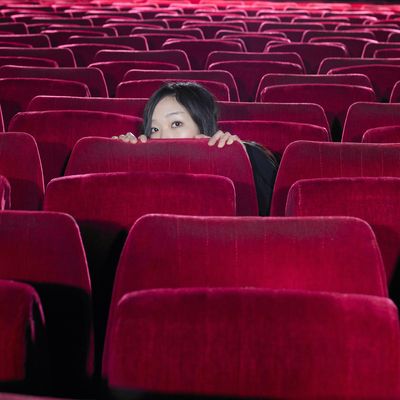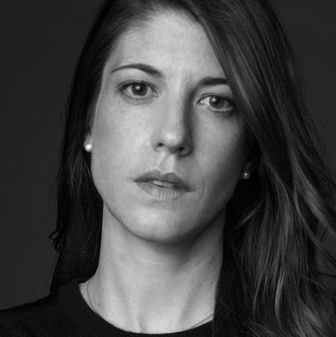
Watching major sporting events, I always wonder what happens to the losers’ hats. By the end of the Super Bowl, the winning coach is covered in ice, his quarterback is grinning in a “World Champions” cap, and somewhere, I imagine, a team of waterboys are scrambling to hide the unused hats designed in case the other guys won.
I imagine something similar happens to famous people’s exes, the woman next to the man — until she wasn’t. And somewhere, languishing in a closet full of unknown hats, there’s a pile of women discarded by ambitious men. (And vice versa.) They’re the unknown Mia Farrows, Jennifer Anistons, and Taylor Swift dumpees. But because Taylor Swift won’t write a song about them, they will simply be forgotten.
No one expects to be this woman (or man). I thought I’d be the ambitious one. I’d be the girl-who-asked-too-many-questions, the exasperating journalist who’d been chasing press passes ever since dressing up as Murphy Brown for Halloween in the fourth grade. (And Connie Chung in the sixth.)
But despite the tabloids’ warnings against dating people gunning for international acclaim, I found myself watching as Emma Stone announced my ex-boyfriend’s name on national television last month. As an independent film producer, not yet 30, he’d received an Oscar nomination for Best Picture. It was a picture I’d moved across the country for — giving up my job, apartment, and friends — a picture that defined the most intense chapter of our relationship, and brought about its end. It would even, in a moment of self-imposed masochism, haunt me professionally when I’d work as a reporter at its New York premiere.
As we watch the stars of television and film totter across awards stages to accept statuettes this weekend, we imagine the beautiful and charmed just did a little yoga and landed up there. When in reality, arriving on that stage of stratospheric achievement usually requires sniper focus, rabid ambition, and take-no-prisoners maneuvering. And what if, in the midst of all that, you fall in love?
I first saw the man we will call the Captain five years ago, standing in the Cathedral of St. John the Divine on 112th Street. It was spring and I was 24. I was circling the room as a novice party reporter, struggling to locate Isabella Rossellini, when I spotted a handsome usher. He was working the event, like a number of the other creatively inclined staff, for a quick cash infusion.
“Hey, so, what’s this whole thing about?” I asked, pulling out my tape recorder. (Years later I’d learn PR people will find celebrities for you and editors don’t want interviews with ushers, however charming, dynamic, and intelligent they might be.) He outlined the historical and academic significance of the event while I smiled and pretended to understand. “Find me after the film,” he said, moving toward the crowd. “I want to hear what you think.” As the house lights came back on, I assumed he didn’t really care what I thought, and so I left without saying good-bye. I never did find Isabella Rossellini.
But the Captain found me eight months later on Facebook and invited me to a play at the Public Theater. He said he was a filmmaker, hated Antonioni, and had googled me. He liked an essay I’d written for my college newspaper. After dinner and whiskey, there was a heavy make-out near an on-street ATM on the Lower East Side. He called the next afternoon and left a rambling message: “Hey, Katie, I’m just calling to say I had a really good time last night, and almost no memory of getting home. But I had a really good time.”
The other men I was kissing on Rivington Street in those days never called the next day, much less to say they had a good time. I’ve always had a thing for what my friends call the “shiny ones”: writers, musicians, painters. An independent film producer. People who always have something fascinating to say, something brilliant to do, and consider their lives in three-month increments. Other girls’ boyfriends worked in cubicles and wanted to get breakfast. Mine were freelance, unreachable before 10 p.m., and available for more of a “situation” than a “thing.” And, by and large, I played by their rules. Besides, I’d always assumed that to have the soul-completing relationship I’d wanted since I was 13, I’d need to make certain sacrifices, including but not limited to my kidneys, hobbies, and hair color.
A few months into dating, the Captain invited me to New Orleans for the world premiere of his film collective’s latest short. After the screening, the crew gathered for a party hosted by the lead actress. She was in her sixties and cracked her first beer around noon. There was a urinal installed in the backyard for events. An uninvited guest cast a voodoo spell on a sleeping camera operator. For the first time, the Captain introduced me as his girlfriend. We fell asleep in a twin bed and waded into the dark ocean where control is relinquished to the tumultuous tides of admiration. I felt underqualified to be his girlfriend, but was lost to the sinkhole of infatuation. I took off work to spend Rosh Hashanah with his family. (I’m Episcopalian.) I drove with him to Westchester to brainstorm when he worked on the script of what would later be called the “best out of [Sundance] in two decades.” I started to look at life in smaller blocks. His schedule had a grab-it-by-the-horns spontaneity, and to keep up I had to suspend my own interests. Yearlong plans became monthlong plans, and one-month plans gave way to weeklong plans.
A year later, when he begged me to leave New York for New Orleans again, I was already like a patient on life support, open to any experimental treatment to hold onto this man. I quit my job in the art department of a magazine, gave up a rent-stabilized apartment in Williamsburg, and divided my belongings between his family’s country house and a dented Ford Explorer. My friends and family slapped their foreheads, but I was in crazy, stupid, irrational love with him.
As we exited I-10 for New Orleans, it felt like everything was possible. We were making stuff — bread, quilts, movies — in a pre-apocalyptic universe removed from the career-centric eastern seaboard. We lived in a two-story house with a balcony that overlooked a tropical garden. Preproduction was in full-force and our house was the headquarters of the operation; the film’s associated court of furniture-makers, painters, and landscapers came over for taco nights and smoothie parties. If it had been a soccer game, I would have been slicing oranges and doling out juice boxes. I rode shotgun on scouting trips but mostly kept my distance, shopping for thrift-store couches and trying to be Murphy Brown.
For a time, the Captain championed my ambitions. He gave me story ideas and picked up 30 copies of every cover story I wrote for the local alt-weekly. He encouraged me to take the dive and trust myself, as talented producers do.
But as the film inched closer to production, he seemed to crack under the pressure. There were one-sided screaming matches (his), tears (mine), and highlighters snapped in half in slow-motion moments of rage (his). The filmmakers didn’t have a lead, the script was a mess, and the producers were in a power struggle with the director’s girlfriend. Unlike me, she had his ear and his attention.
One night he wanted to see an Obama documentary. I wanted to have dinner. He started yelling and punched a hole in the drywall. I picked up my phone and dialed a friend who lived in the neighborhood. She walked into the kitchen minutes later. She’s from California, is partial to green juices, and speaks in terms of safe spaces and power dynamics.
“You’re not safe here,” she said. I looked at the hole in the wall and while I didn’t quite believe that was true, I saw her point. Wiping away snotty sobs, I stuffed some clothes into a duffel and climbed into her car.
A couple of days later I found him eating alone at the local African restaurant. We sat outside on the stoop and had a messy cry. “It’s probably better if we break up,” he said. To pull off the project, he’d need to give it his full attention. I took the car; he took the filmmakers, the production, and the film. I knew it had never been mine, but it still felt like being uninvited to a party after consulting on the caterers, offering feedback on save-the-dates, and listening as tent rentals were priced out. Over the next three months, everyone I knew in New Orleans decamped to the bayou. Any mention of the movie felt like a sting.
Nearly three years later, I was standing on the red carpet at the film’s New York premiere. I was single and party reporting, but this time I knew what I was doing. (Or at least I was getting more press passes.) My editor had needed a reporter at the last minute, and because, like a hungry tadpole, I will take any assignment, I agreed. I faced the meta-torture as I imagined Connie Chung would — with a shot of whiskey and a glass of red wine. Besides, the Captain had always pushed me to do what scared me.
I was interviewing the lead they finally found, when he dashed across the red carpet and into the photographers’ flashes. Predictably, he was running late, holding a paper bag of greasy takeout. Watching as he compulsively tucked his shirt into a recognizable outfit, I thought of my own flaws I was so sure he would discover when we were dating. Really just a collection of first-world fears — being a nerd, being intellectually unoriginal, a destiny to die alone with cats, and being fat. I’d thought that if I stood close enough to him, and basked in his glamour, creative radiance, and sporadic affection, I would be fixed. In the end, I did acquire a deeper knowledge of art house films. But when he was gone I’d also picked myself up after splattering, face-first, alone, in south Louisiana. And that sort of thing is always good for generating self-love.
All that time, I’d thought the dynamic of our relationship had been me versus the movie, with the movie as the victor. But, looking down at the tape recorder I was holding, interviewing the film’s celebrated director, I realized it was my ambition that pulled us apart. I left because I didn’t want to be yelled at anymore, I didn’t want to follow a man around, and I didn’t want to hold juice boxes on the sidelines of someone else’s game. I left because I was finally ready to take my aspirations as seriously as I took his. I wanted to be standing exactly where I was currently standing. And he wanted to be standing exactly where he was.
In interviews, the movie’s director has described the film as a story in which the characters’ actions are driven by emotion rather than logic. Eight minutes into the screening, shrouded in the theater’s darkness, drops poured from my eyes. The tears came in waves. They were for lost love, for our tornado fights, for missing Louisiana, and because the movie was beautiful, brilliant, and perfect.
After the final scenes, when the protagonist faces down her juggernaut, I sat and waited as the credits began to roll. (The Captain always stayed for the credits.) In the far right column, towards the bottom of the acknowledgments, my weird two-part name floated by in all-white caps. It felt like a silent wink, a quiet apology, and a subtle recognition that I’d been there. My contributions, however minor, meant something. And suddenly, the gaping hole in the drywall felt like a long time ago.





